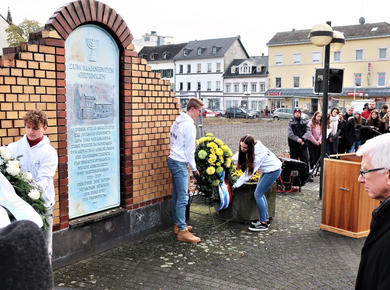Posted: February 17, 2020
The 2019 meeting of European Mennonite leaders took place on a historical date for Germany: the anti-Semitic pogroms of the Reichskristallnacht (“night of broken glass”) 9–10 November 1938 when Nazi paramilitary forces and civilians throughout Germany and Austria looted Jewish-owned stores, damaged Jewish buildings, burned 267 synagogues and incarcerated more than 30 000 Jewish men.
As part of this year’s Mennonite gathering, we attended a commemoration service together with some 200 city authorities, civil organisations, local church and religious leaders and Neuwied citizens.
City authorities expressed appreciation for our participation in the event at the memorial site of the Neuwied synagogue that was destroyed in 1938 riots.
We do not have any reports about the reaction of the Neuwied Mennonites to those events, but it seems they were quiet, politically indifferent toward the atrocities against the Jews. We must ponder what are the lessons from those events for modern-day Mennonites and examine our involvement in situations like those as followers of Jesus.
The Mennonite Brethren congregation (AMBD: Arbeitsgemeinschaft Mennonitischer Brudergemeinden in Deutschland) hosted the 7–10 November 2019 meeting in Neuwied.
In the past, this annual meetings of the chairs of the European Mennonite conferences was an informal meeting of representatives of the four “historical” European Mennonite conferences – Switzerland, Germany, France and the Netherlands –for a couple of hours to share new developments, to discuss a few common concerns and prepare for MERK (European Mennonite regional conference).
Now, participants include the newer European Anabaptist conferences (Portugal, Spain, Lithuania, Ukraine, Italy, England) and representatives of the Russian immigrant churches in Germany and of networks, such as the Anabaptist Network in the United Kingdom, Mennonite World Conference, MCC Europe, ICOMB, Multiply Europa (formerly MB Mission), the Mennonite historical society, and other ecumenical guests. Some but not all of the conferences are Mennonite World Conference members.
We meet to get to know each other, listen to reports, share concerns and challenges, discuss common vision, and worship with local Mennonite churches. This time, we also talked about the commemoration of the 500 years of the Anabaptist movement in 2025.
A very meaningful part of our time was the visits with church members and leaders on our tour to Mennonite congregations in the city. Neuwied has eight Mennonite and Mennonite Brethren churches with some 3 000 members.
The churches belong to several conferences with different histories and variations in cultural and theological imprint. Some number more than 850 members and worship in several places (multisite). Several are involved in education (running a school), refuge work, evangelism and outreach. Only two of these churches are part of the MWC member conferences. Others are more mainstream evangelical or more conservative in their orientation. Most of these congregations are organized by Mennonite immigrants from the former Soviet Union (Ausseidler).
The welcome was sincerely open and cordial. Our visits though short were meaningful interactions. We shared mutual interests and concerns so reciprocal understanding could grow. Our hosts appreciated learning about the wide international and theological scope of this group of European Mennonite leaders.
—A Mennonite World Conference release by Alexander Neufeld is the Executive Committee representative for Europe. He is a member of Arbeitsgemeinschaft Mennonitischer Brudergemeinden in Deutschland, a Mennoite Brethren conference in Germany.

Join the Conversation on Social Media
FacebookTwitterInstagramFlickrYouTube